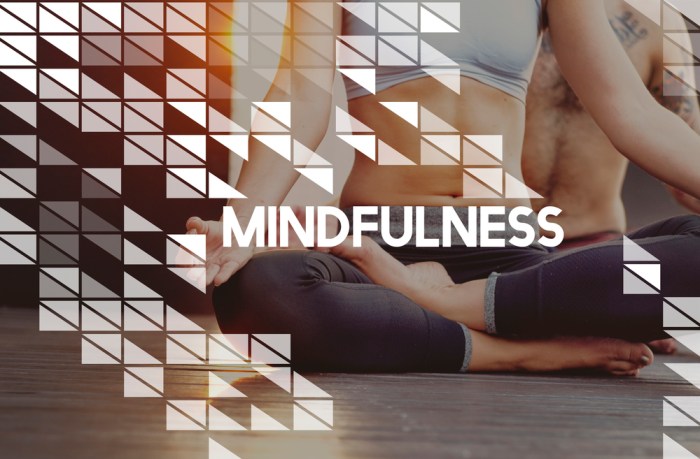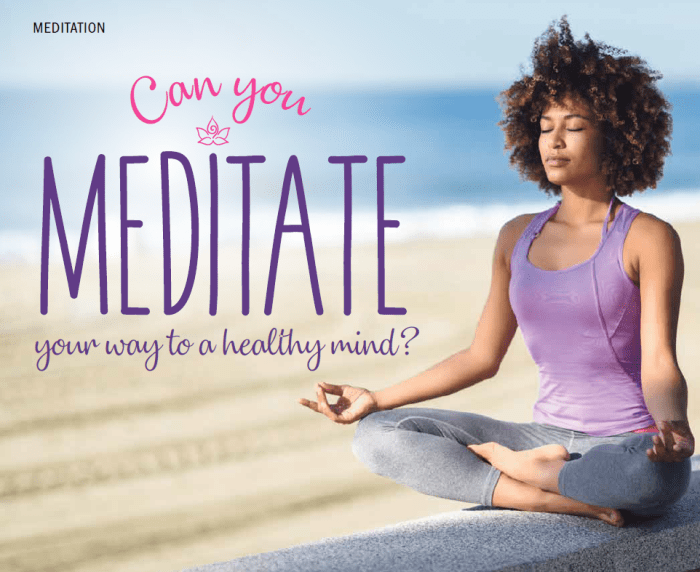Embark on a journey to discover the art of meditation for cultivating a resilient and vibrant mind with our comprehensive guide on How to Meditate for Building a Stronger, Healthier Mind.
Explore the depths of various meditation techniques, understand the significance of a consistent routine, and learn to overcome common challenges along the way.
Importance of Meditation for Mental Health: How To Meditate For Building A Stronger, Healthier Mind

Meditation is a powerful tool that can significantly impact mental health and well-being. By incorporating meditation into your daily routine, you can experience a wide range of benefits that contribute to a stronger and healthier mind.
Meditation can also help strengthen your inner peace and calm. By quieting the mind and letting go of stress, you can cultivate a sense of tranquility and serenity within yourself. If you’re interested in learning how to meditate to strengthen your inner peace and calm, check out How to Meditate to Strengthen Your Inner Peace and Calm.
Reduction of Stress and Anxiety Levels
- Meditation has been shown to reduce the levels of stress hormones in the body, helping individuals manage and cope with daily stressors more effectively.
- Regular meditation practice can also lower anxiety levels by promoting a sense of calm and relaxation, allowing individuals to approach challenges with a clear and focused mind.
- By engaging in mindfulness meditation, individuals can learn to observe their thoughts and emotions without judgment, leading to a reduction in anxiety symptoms and an overall improvement in mental well-being.
Improvement in Focus and Concentration
- Meditation exercises the brain like a muscle, enhancing cognitive function and sharpening focus and concentration abilities.
- Through mindfulness meditation, individuals can train their minds to stay present and attentive, improving their ability to concentrate on tasks and activities.
- Studies have shown that regular meditation practice can increase grey matter in the brain regions associated with attention and concentration, leading to improved cognitive performance and mental clarity.
Basics of Meditation Techniques

Meditation techniques come in various forms, each offering unique benefits for the mind and body. Here, we will explore different types of meditation techniques suitable for beginners, the role of mindfulness meditation in promoting mental well-being, and the importance of incorporating deep breathing exercises during meditation.
One effective way to enhance your self-discipline is through meditation. By practicing mindfulness and focusing on the present moment, you can improve your ability to stay on track and resist temptations. To learn more about how to meditate for enhancing your self-discipline, visit How to Meditate for Enhancing Your Self-Discipline.
Different Types of Meditation Techniques
- Guided Meditation: Involves listening to an instructor or recorded audio to lead you through the meditation process, making it ideal for beginners.
- Mantra Meditation: Focuses on repeating a word or phrase to help calm the mind and enhance concentration.
- Transcendental Meditation: Involves sitting with closed eyes and silently repeating a mantra to achieve a state of relaxed awareness.
Role of Mindfulness Meditation
Mindfulness meditation is a powerful technique that involves focusing on the present moment without judgment. This practice can help individuals develop a healthier mind by increasing self-awareness, reducing stress, and improving overall mental well-being.
Importance of Deep Breathing Exercises
Deep breathing exercises play a crucial role in meditation as they help to calm the mind and body, reduce anxiety, and improve concentration. By incorporating deep breathing techniques into your meditation practice, you can enhance the effectiveness of your sessions and experience greater mental clarity and relaxation.
Creating a Meditation Routine

Establishing a consistent meditation routine is crucial for reaping the full benefits of this practice. Here are some tips to help you stay committed to your meditation practice.
Finding a Quiet and Comfortable Space
When choosing a space for meditation, opt for a quiet and peaceful environment where you can focus without distractions. This could be a corner of your room, a serene spot in nature, or any place where you feel relaxed and at ease.
Ideal Time of the Day to Meditate, How to Meditate for Building a Stronger, Healthier Mind
The ideal time to meditate can vary from person to person, but many find that early mornings or evenings before bed are optimal for mental clarity and relaxation. Experiment with different times to see what works best for you and try to stick to a consistent schedule for maximum benefits.
Overcoming Common Challenges in Meditation

Incorporating a meditation practice into your routine can come with its own set of challenges, especially for beginners. It is important to address these obstacles to ensure a successful and fulfilling meditation experience.
Distractions during Meditation Sessions
- Acknowledge distractions: Recognize when your mind starts to wander and gently bring your focus back to the present moment.
- Focus on your breath: Use your breath as an anchor to keep you grounded and centered during meditation.
- Practice patience: Understand that distractions are a natural part of the meditation process and practice patience with yourself as you work to overcome them.
- Create a designated space: Find a quiet and comfortable space free from distractions to enhance your meditation practice.
Dealing with Racing Thoughts and Restlessness
- Label your thoughts: Instead of getting caught up in your thoughts, try labeling them as “thinking” and gently guide your focus back to your breath.
- Body scan technique: Start with focusing on different parts of your body, noticing any tension or discomfort, and releasing it as you continue to meditate.
- Use guided meditations: Utilize guided meditation apps or recordings to help you stay focused and calm during your practice.
- Practice regularly: Consistent meditation practice can help reduce racing thoughts and restlessness over time, allowing you to experience deeper levels of relaxation and focus.
In conclusion, mastering the practice of meditation not only enhances mental well-being but also fosters a profound sense of inner peace and clarity. Embrace this transformative journey towards a healthier mind today.
Another benefit of meditation is emotional freedom and self-love. By practicing self-care and compassion towards yourself, you can let go of negative emotions and cultivate a positive mindset. If you want to explore how to meditate for emotional freedom and self-love, visit How to Meditate for Emotional Freedom and Self-Love.